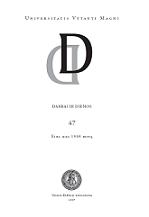Trečio fronto agonija. Paskutinio numerio paieškos
The agony of the third front. Looking for the last issue
Author(s): Leonas GudaitisSubject(s): History
Published by: Vytauto Didžiojo Universitetas
Keywords: agony; front; issue; war; The Third Front; communism;
Summary/Abstract: This study focuses attention on the most controversial issue of 'The Third Front", a journal conceived by a group of young writers in search of innovations. The last issue, the 6-7th, was prepared over time during the second half of 1931, but it was never published. The dramatic twists and turns of the issue's publication highlight the far more important, far-reaching cultural, social and political trends and processes that ought to be linked to purposeful incursions into the Lithuanian press by communist ideology. At that time the Lithuanian press was turning leftwards. The Third Front" was unable to find a niche of its own despite its experiments in neo-realism and the glorification of the "Lithuanian farm-hand". It thus set out to shock society with attempts at proletarian writing and soon became interested in the theory and practice of building socialism in Soviet Russia. The Front's naive efforts to give voice through literary texts to the idea of class struggle and the need for revolutionary reforms in Lithuania ended with a quick stroke of the censor's pen and the closing of the journal. Having taken a pro-communist direction with the fourth issue, The Third Front" was nonetheless subject to brazen attacks by the Communist party's dogmatic press intent on safeguarding Soviet purity in proletarian publications. Its priorities manifested themselves through inflammatory street gossip and volleys of demagogic accusations leveled against those who thought differently and did not yield to its dictates. The writers of the Third Front" bore patiently these humiliations. They also carried out rather obediently demands to "cleanse themselves", i.e. eject members ill-disposed towards the Communist party. Half of the writers left. The remaining ones competed with each other, thus demonstrating their fidelity to the ideals of communism. Finally, when well-tested traditional methods of class struggle were applied to the 'Third Front", tensions and internal struggles increased further, ultimately breaking up the 'Third Front". In some cases, hatred remained the only real link among writers in their personal relationships. Discussions held at the 28th convention (1981) of Santara—Šviesa in Michigan (USA) pointed the arrow of criticism at the Communist party press as the fiercest dismantler of the journal. But a concrete analysis of events shows that that charge must be leveled against the better part of the writers of the Third Front": they themselves sought contacts with like minded individuals who harbored suspicious intentions.
Journal: Darbai ir dienos
- Issue Year: 2007
- Issue No: 47
- Page Range: 201-236
- Page Count: 36
- Language: Lithuanian

